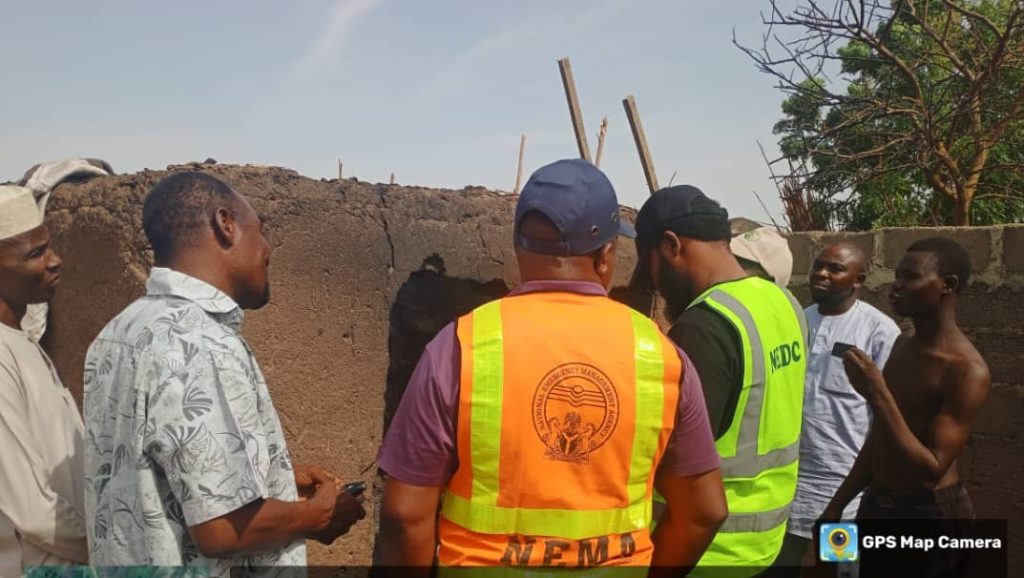The National Emergency Management Agency (NEMA), in conjunction with the Adamawa State Emergency Management Agency (ADSEMA), the North East Development Commission (NEDC), and local authorities, conducted a comprehensive assessment of communities ravaged by recent windstorms and fire incidents in Song Local Government Area, Adamawa State. This collaborative effort, aimed at understanding the full scope of the disaster and facilitating efficient relief distribution, focused specifically on Ndubande, Angwan Madaki, and Sabo Geri communities, where residents suffered significant losses of homes, livelihoods, and essential resources. The assessment team, led by Mr. Musa Yakubu of NEMA’s Planning, Search and Rescue Operations (PSARO) department, meticulously surveyed the affected areas, documenting the extent of damage to residential structures, food stores, and personal belongings. This on-the-ground evaluation served as a crucial first step in ensuring that accurate information reaches the relevant authorities, enabling them to mobilize resources and provide timely assistance to those most in need.
The devastation wrought by the windstorms and fires has left a deep impact on the affected communities. Homes were reduced to rubble, leaving families without shelter. Food stores and reserves, often representing months of hard work and preparation, were destroyed, jeopardizing food security for vulnerable individuals and families. The loss of motorcycles, a vital means of transportation and income generation in these areas, further compounded the economic hardship faced by residents. The combined impact of these losses represents a significant setback for the communities, undermining their ability to rebuild and recover independently. The assessment team recognized the urgent need for intervention, assuring affected residents that their plight would be swiftly communicated to the appropriate authorities to expedite relief efforts.
Mr. Yakubu, speaking on behalf of the assessment team, expressed NEMA’s deep concern and sympathy for the victims, emphasizing the agency’s commitment to ensuring a prompt and effective response. He highlighted the immediate priority of providing essential relief materials to address the pressing needs of those left homeless and without basic necessities. The assessment aimed to provide a detailed damage report that would serve as the foundation for a coordinated relief distribution effort involving all stakeholders. The joint presence of officials from NEMA, ADSEMA, and NEDC underscored the collaborative nature of the response, ensuring a unified and streamlined approach to assisting the affected communities.
The collaboration between NEMA, ADSEMA, NEDC, and the local government chairperson exemplifies the importance of interagency cooperation in disaster management. By pooling resources, expertise, and local knowledge, these organizations were able to effectively assess the situation and develop a coordinated plan of action. The inclusion of the local government chairperson ensured direct engagement with community leaders and facilitated a better understanding of the specific needs of the affected populations. This collaborative approach not only enhances the efficiency of relief efforts but also fosters trust and transparency, ensuring that assistance reaches those who need it most.
The assessment team’s meticulous documentation of the damage will play a critical role in guiding the subsequent relief and recovery efforts. The gathered information will help determine the type and quantity of relief materials required, ensuring that aid packages are tailored to the specific needs of the affected communities. This data-driven approach will minimize duplication of efforts and maximize the impact of assistance provided. Furthermore, the assessment will inform long-term recovery strategies, helping communities rebuild their infrastructure and livelihoods in a sustainable manner. The data collected will also be invaluable in future disaster preparedness planning, enabling authorities to identify vulnerabilities and implement measures to mitigate the impact of future disasters.
In the coming days, the collaborative efforts of NEMA, ADSEMA, NEDC, and local authorities will translate into tangible assistance for the affected communities. The coordinated distribution of relief materials, based on the assessment’s findings, will provide much-needed support to those who have lost their homes, livelihoods, and essential belongings. This relief effort will address immediate needs such as shelter, food, water, and medical supplies, while also laying the groundwork for long-term recovery. The commitment of these agencies to working together ensures that the affected communities receive the support they need to rebuild their lives and regain a sense of normalcy. The assessment serves as a powerful example of the importance of preparedness, collaboration, and swift action in mitigating the impact of natural disasters and supporting those affected.














